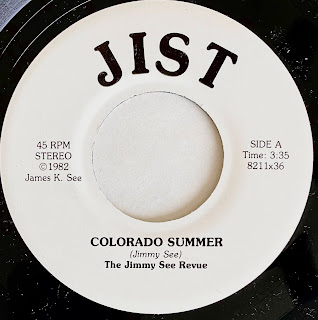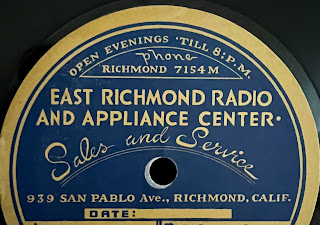In 1972, during a
pre-patrol roll call at the Denver Police District 2 offices, Captain Doral
Smith asked his officers a question nobody had ever heard him ask – if anyone
played a music instrument.
“Our district was
in the northeast part of Denver and, at that time, there was quite a bit of
racial tension,” said Michael Gargaro, who was then an officer, stationed at
the District 2 station. “Captain Smith’s intentions were to connect with city
youth, through music.”
Gargaro, who
played guitar and keyboards, raised his hand, along with guitarist Paige Lyda,
bassist Dave Kechter.
Their first gig
was performing for the annual police Christmas party, attended by such political
and community luminaries as then-governor Richard Lamm, then-Senator (and later
Presidential candidate) Gary Hart, (senator and later Presidential candidate)
Pat Schroeder, and Bill McNichols (then-Denver mayor).
“We put together a
dozen songs and performed. It went so well it was decided that we should have a
drummer and a name. A few days later an officer by the name of Wulf Kroekel was
recruited to the band. Within a week we
settled on the name “Squad IV.” Sergeant
Don Westbrook would supervise the group, as per regulations.
The newly-formed
group immediately started being booked by schools and community groups. "East
High School was our first official concert in a Denver Public School [picture above]". The concept of seeing police officers playing
pop music was a hit with students, and proved to be a successful public
relations idea for the department. One which was quickly getting noticed,
outside of Denver.
“We got an offer
to go on the Johnny Carson Tonight Show. We had made some tapes back
then, and Johnny’s show producer, asked to hear them, and booked us. We had our
plane tickets and everything. We were so excited. But, even back then, there
was political correctness. The producer of the show had second thoughts. They
were concerned that it would divide their audience. We were really
disappointed.”
While the Carson
appearance was a bust, it energized the group to get into the studio, to
record.
“Captain Smith
contacted his friend Don Martin, over at KIMN. He had a studio and he got us
in, and we worked with some studio musicians for back up stuff. We didn’t
really like the recording process. We wanted to record live. Don explained
that’s not how you do it. It sounded fake and we weren’t happy. In the end it
was combination of live and overdubs."
Squad IV – Volume
One (Silver and Blue)
served as a promotional item at school events and community concerts. The money
made from the disc was earmarked for the local March of Dimes. The 7” EP
contained four songs – “I Believe in Music” (Mac Davis cover) / “Proud Mary”
(Creedence Clearwater Revival / Ike and Tina Turner cover) and “Steamroller
Blues" (James Taylor cover) / “Joy to the World” (Three Dog Night cover).
Gargaro believes 1,000 copies were pressed. Other credits on the disc include
Ralph Harrison, Dean Tellefson, and Jim Schumacher.
Squad IV would
not, of course, be the only law enforcement band in Denver. Early in the
formation of the group, Captain Smith enlisted the help of Bo Cottrell, who was
a member of the very popular group, the Lawmen, which included members of the Jefferson County Sheriff's Department.
"Doral got a hold
of Bo Cotrell and told him what his plans were for the group. It was Bo who
actually helped us. We even got to perform downstairs at Taylors supper club while
the Lawmen performed upstairs in the main showroom upstairs. There was never
any competition between us and the Lawmen. They were more like the Kingston
Trio, with some comedy thrown in.”
As Squad IV’s
popularity exploded, it was suggested that the next single should move away
from cover versions of Top 40 songs.
“Knowing that we
had a possibility of national fame, it was recommended that we record
originals. People told us we were going to be big,” Gargaro said.
For the second
record (entitled Volume 2) the band enlisted the help of Fred Arthur
Productions. The disc would include the songs “Love Is Forever” (composed by
Paige Lyda), and “Bad Dreams” (written by Michael Gargaro). Gargaro believes
1,000 copies were pressed.
While Squad IV’s
national debut on the Carson show didn’t go as planned, they would go on to
interact with a diverse group of nationally-known performers and politicians – including Marc
Bolan, (T-Rex) Engelbert Humperdinck, B.B. King, Donna Fargo, the Oak Ridge Boys,
Kenny Rogers, the New Christy Minstrels, and promoter Barry
Fey. Squad IV also performed for (then) Vice President George H.W. Bush.
“We were playing
at the Playboy Club in Denver, at the top of the Radisson, off Lincoln Street.
It was not really what a person would think. It was a very professional
environment. Very high class. They had two rooms that had live band music, and
another for comedians. [Denver's-own Fats Johnson was the in-house comedian]. We played there on our
off-duty time, with permission from the Police Department. We had several
stints there. Anyway, T. Rex had played that night, in Denver and the band
members were staying at the Radisson. All of a sudden, they walk in, and start
hanging out. They noticed that our equipment was like theirs, so they come up
to the stage and started playing.” Squad
IV Also performed for Engelbert Humperdinck at the Playboy Club, after his
appearance in Denver.
The group would go
on to open for BB King, at Denver Coliseum. In 1981, when the Oak Ridge Boys
came to Colorado, they specifically requested Squad IV as their opening act.
“A few years after
that the Oak Ridge Boys came back to Denver, to do a show with Kenny Rogers.
Their manager called us and asked if we wanted to meet Kenny. They were staying
at the hotel near the stadium and had us escorted to the event to meet Kenny. We
gave them all some Denver Police ball caps as a thank you for their kindness"
While the band was
riding high on local popularity, the original line-up would soon change.
“We were together
for about five years, then we replaced Wulf,” he said. “He decided that he
wanted to be more involved in promoting the band.”
Officer Gary
Kerchmar was brought in to replace Kroekel, but he wouldn’t last long. “So, Doral
put out the word, and we had a drum competition. I think three or four guys
auditioned, and that’s where we got Jerry Martinez.”
Bassist Dave
Kechter would be replaced by Rodger Berry (who was replaced by Tony Gardella).
Guitarist Paige Lyda was a police artist and would soon be promoted to
detective. He would be replaced by John Smith, who was later replaced by Jerry
Arellano and Michael Thompson.
While the band was
a fun diversion from patrol responsibilities, many of the band members wanted
to be back out on patrol. “I think they thought this would be like a military
band, but for a lot of the guys, we wanted to be out on the street,” Gargaro
said.
Captain Smith
would soon retire, and Squad IV would be moved into community services – doing
DARE programs, and other school resource responsibilities. The department would
then go through another major shake-up. While Police Chief Ari Zavaras
supported the band idea, those who would followed him did not fully endorse the
program.
“After a couple of
years, the department insisted that we work the street. We continued to play,
on our own – with permission.”All the
members were eventually promoted to detectives and moved on.
Squad IV’s
affiliation with the Denver Police Department ended in 1985, but they didn't disband. When they started playing on our own, they added several band
members – Marty Martinez on keyboards and trumpet, and Bob DeGasperis, saxaphone.
Bob would pass away in 1999, Ricky Martin, who still performs in local Denver
area bands and bassist Eddie Perez who currently performs in church worship
bands in the metro Denver area. Squad IV officially broke up, in 2016, after
Rodger Berry passed away.
“We were at
the point where there were only three members left, and using fill ins just
wasn’t working." Gargaro said.
Original member
Dave Kechter passed away in 2009.“I ended up being
the only original until the end,” Gargaro said. “It’s funny, none of the
members in the band ever thought about giving up their police gigs to be music
stars. Every one of them reached full retirement, and I did 30 years.”
At 71, he runs his
own security business, Covenant Community Services. He has fond memories of his
time in Squad IV, and still runs into people who feel the same.
“Every now and
then we will run into people who remember when we came to their school. One guy
told me Squad IV was the reason he became an officer.”





























































